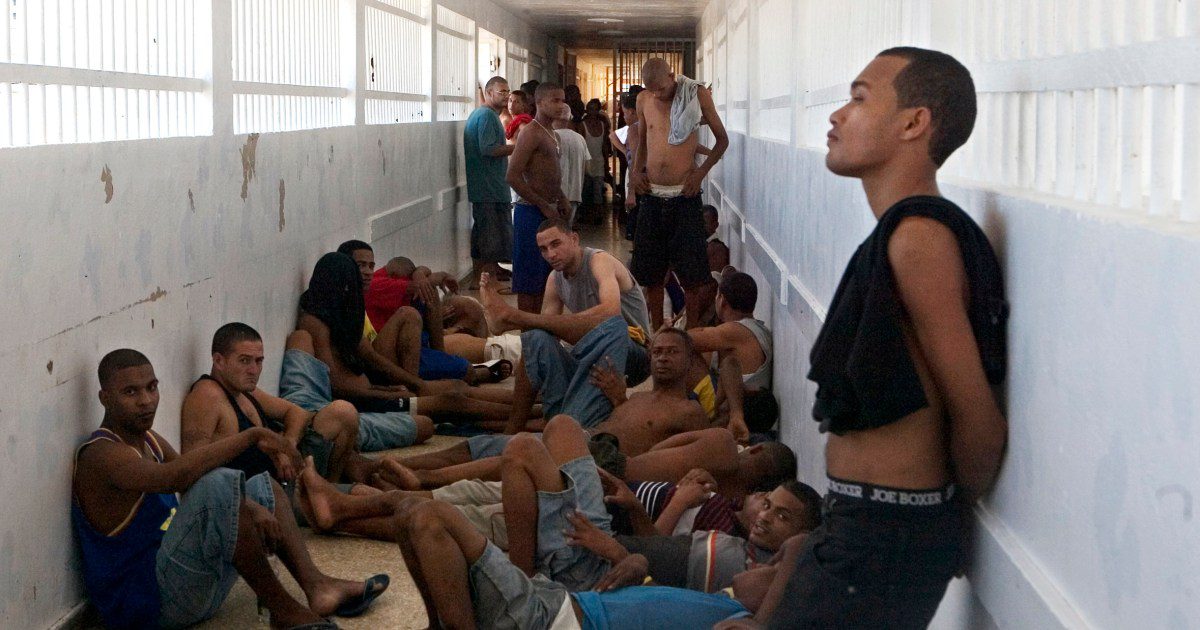
SANTO DOMINGO, Dominican Republic — Inmates known as “frog men” are subjected to harsh conditions in prisons throughout the Dominican Republic, often sleeping on cold floors adjacent to overflowing toilets and makeshift waste areas.
These facilities are severely overcrowded, with some prisons operating at seven times their intended capacity. A significant number of inmates are held without formal charges, and human rights advocates express deep concern about the inhumane living conditions and inadequate medical care that many face.
Despite promises for systemic reform, critics argue that the Dominican Republic continues to prioritize pretrial detentions in almost all criminal cases lacking formal charges. Reports indicate little has changed, as issues within the prison system continue to escalate.
“Prisons have become no man’s land,” commented Rodolfo Valentín Santos, director of the National Public Defense Office of the Dominican Republic.
Statistics show that over 60% of the approximately 26,000 inmates are held under preventive detention, often without any criminal charges, according to the National Public Defense Office. While supporters of this practice claim it serves to protect the public and allows for evidence gathering, some individuals have endured as many as 20 years in prison without ever being convicted.
Valentín emphasized that preventive detention should be an “exceptional” measure according to the nation’s Constitution and penal code, yet alternatives like bail are seldom utilized.
‘We have a situation’
Recently, Darwin Lugo and Yason Guzmán exited La Victoria National Penitentiary, situated in the northeast of Santo Domingo.
Originally designed for a maximum of 2,100 inmates, La Victoria now houses over 7,000, with more than 3,300 in pretrial detention, as reported by the National Public Defense Office.
Being the oldest and most overcrowded prison in the nation, the facility presents alarming conditions.
“You must be vigilant for your life here,” cautioned Lugo, who visited friends at the prison alongside Guzmán. “Many are struggling,” Guzmán added, referring to the overwhelming poverty among the inmates.
Their friends, who have already spent over five years incarcerated, are well-linked and occasionally ask for money or assistance with their cell phone’s SIM card.
Last year, at least 11 inmates lost their lives in La Victoria due to a fire and subsequent explosion ignited by a short circuit. This incident marked one of the deadliest prison fires since 2005, when at least 134 inmates perished in Higüey after rival gangs set bedding on fire.
Following the tragic incident at La Victoria, Dominican President Luis Abinader appointed former prison director Roberto Santana to lead a commission aimed at reforming the nation’s prison system, which includes over 40 facilities.
“We must acknowledge that our prison system faces a crisis,” Abinader stated during the announcement of Santana’s appointment last March, adding that funds recovered from corruption cases would be allocated to build new prisons.
Santana has consistently advocated for closing La Victoria and 15 de Azua prisons located in the western part of the country. He asserts that the commission he heads is working on substantial reforms without external influence.
“We operate independently of political pressure,” affirmed Santana, who previously trained personnel for prisons established in the early 2000s.
Santana, formerly the president of the Federation of Dominican Students during the 1970s, has firsthand experience with La Victoria’s harsh conditions, having spent two years in solitary confinement there.
‘On the brink of collapse’
In the early 2000s, the Dominican Republic initiated the construction of 21 new prisons to enhance conditions, staffed by trained personnel rather than police. However, reports from the National Commission of Human Rights indicate a decline in conditions even in these newer facilities.
The commission’s 2023 report highlighted a prison system on the verge of collapse, citing rampant overcrowding and lack of basic necessities such as restrooms, natural light, and adequate ventilation. Health issues are widespread, with around 5,000 inmates suffering from serious medical conditions like heart disease, cancer, and HIV, yet many receive only limited medical care, with some facilities lacking any medical staff, according to Valentín’s office.
As detailed in their 2023 report, the National Public Defense Office has called for closures of certain prisons, including one situated in the coastal city of Nagua.
“The extreme overcrowding renders true rehabilitation impossible, as inmates are effectively ignored by the state,” the report concluded. “Their treatment reflects a view of them as mere objects rather than individuals with rights.”
Conditions have become so severe in one facility that inmates were held outdoors in metal-roofed trucks under the scorching sun, leading to lawsuits against the government, according to Valentín.
Attempts to interview Col. Roberto Hernández Basilio, the director of prisons, did not receive a response. Hernández has previously stated that efforts are being made to improve prison conditions.
On the other hand, Dominican Attorney General Miriam Germán Brito has voiced opposition to pretrial detentions but acknowledged that the ultimate decision lies with judges. A spokesperson disclosed that Germán is currently unavailable for media interviews.
Both Santana and Valentín believe that government corruption contributes to the stagnation in prison reform, alleging that officials and law enforcement personnel are benefiting from illegal practices.
Moreover, corruption has stalled the construction of a planned prison that was expected to alleviate the overcrowding crisis.
Despite the half-finished prison standing idle, Santana anticipates the construction of 25 new facilities, capable of accommodating over 20,000 inmates, by 2028.
Even with the promise of new prisons, activists remain concerned that individuals are not released even when legally mandated by judges. The National Commission of Human Rights pointed out that approximately 2,700 inmates remain incarcerated due to bureaucratic delays in the courts. Additionally, hundreds continue to be held despite being released officially, as they cannot pay court-ordered fines.









